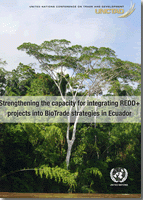
Market based mechanisms for climate change mitigation and trade of biodiversity-based products and services offer an opportunity for countries to conserve their forests and invest in low-carbon emission paths to achieve sustainable development. The mitigation of carbon emissions can be done through REDD+ by reducing emissions from deforestation and forest degradation while fostering the conservation and sustainable management of forests and its forest carbon stocks. On the other side, positive market trends for environmentally and socially fair products and services derived from biodiversity are being captured by countries working under the BioTrade Initiative of UNCTAD. The later promote trade and investment in biodiversity-based sectors as a way to achieve sustainable development in 21 countries in Africa, Asia and Latin America.
The combination of REDD+1 and BioTrade offers additional financial incentives for developing countries to reduce carbon emissions from deforestation and forest degradation while sustainably using and tradings derived products and services such as essential and vegetable oils, and ecotourism, among others. Harnessing these opportunities for developing countries is what UNCTAD aimed to explore and enhance through the project "Strengthening the capacity of policy-makers and business leaders in three BioTrade beneficiary countries in integrating REDD+ projects into BioTrade strategies" in Colombia, Ecuador and Brazil.
In Ecuador, the project aimed to address the following assumptions "Is it possible to merge BioTrade and REDD+ projects? Are they complementary? Is there any advantage as to setting this double approach or is it better to keep them as separate efforts? Is there a reasonable strategy to pursue them consequently?" The work started with an analysis of the background and the current developments on BioTrade and REDD+ in Ecuador, which led to establishing development drivers and common grounds. The national report compiles the findings, assessing the legal and policy frameworks related to sustainable development, climate change and REDD+, and biodiversity. It also describes the REDD+ and BioTrade´s evolution in Ecuador and maps their stakeholders.
1REDD = Reducing Emissions from Deforestation and Forest Degradation


